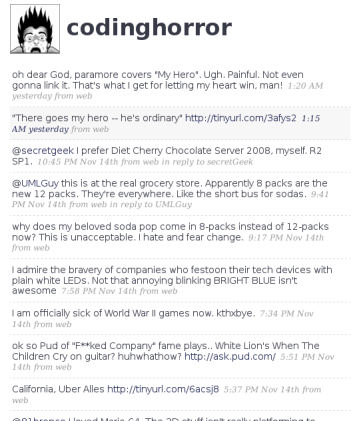The death of the essay

Jeff Atwood's Twitter feed2.
Before the invention of the Internet, people used to write letters to one another. A century ago, people in the United States used to pay $0.05 to send a letter which, with inflation factored in, would cost $1.14 today.
The fact that letters took days to travel to their destination and sending one costs comparatively more than than it does today meant that when people did write, they wrote at least a few hundred words.
Today, we’re living in a time where you can communicate instantly right across the world to thousands of people simultaneously for virtually no cost. In this climate, the impetus shifts from writing long, carefully written and carefully considered pieces to a focus on immediacy and the “now.”
This change has been crystallising in front our eyes for the last decade.
I first experienced the wonders of electronic communication as a youngster when I signed up for my first e-mail account. All the cool kids were signing up to Hotmail when I was fifteen years old, so I got in on the deal. To cut a long and relatively boring story short, it quickly occurred to me that you could use this tool as a primitive instant messenger - provided the person you wanted to talk to was on-line at the same time. This was perhaps my first experience of the world of micro-messaging.
At the turn of the century, our household finally connected to the Internet. One of the first applications I fired up was mIRC and this was my first experience with the world of instant messaging. To me, this was a much more important experience than the first time I browsed the web. Here was a tool I could use to communicate to my friends instantly for virtually no cost. It was amazing being able to communicate in real time by typing messages out to each other. Here was a place where everyone could speak at once and yet, because the communication was written, everyone could be heard. It was one of the few times where I was genuinely amazed by computing.
Later, I got my first mobile phone and with that came the glorious innovation of SMS. This was another crucial step on the way towards micro-messaging. At first, SMS messages were limited to just 160 characters and it cost twelve pence to send a message1. Therefore, your messages had to be short and each message had to be positively useful for it to be worth the cost of sending one. Of course, different people have different ideas of what useful meant; but I digress. Due to the lack of spam on mobile phones and the fact I always have my mobile to hand, this remains my primary form of communication, even today.
We fast forward to today and we see the likes of Twitter, or the all important news feed on Facebook and we’ve now got to the point where every tiny, inane detail, of one’s life is logged for the world to see; and most people share these details to all and sundry without any consideration of the implications of what they’re doing.
And I wonder if we’ve lost something. Have we dumbed down to the point where any thought that can’t fit in to the Facebook news feed is automatically worthless? Has the world’s attention span decreased by so much that nobody has the attention span to even read a letter any more, let alone write one?
I don’t want to lay on the hyperbole too thick since I’m starting to border on the absurd but there is some sort of point there. I just wonder, if we don’t have to invest any effort in talking to each other, if we encourage short brutish talk, then we don’t really have any reason to value what we say. If we don’t value what we have to say then what is the point of saying it?
So I ask, is Twitter the ultimate in onomatopoeia; the service that sounds like it is? The annoying drone of a thousand thoughtless monkeys battering away on keyboards producing nothing of value. I guess what I’m really trying to say is what is the point of Twitter? What is the point of micro-blogging to the world?
1 Technically, they still are limited to 160 characters but from the user’s perspective, you can seemlessly chain many messages together to make one much larger message.
2 Atwood is major proponent of Twitter, which is why I’ve used his Twitter feed as an example. However, he is an unusual user of Twitter in the sense that he can actually write. His blog, Coding Horror, contains a number of interesting and well written articles. Yet, even for a talented writer like Atwood, it is impossible for him to use Twitter in a way that doesn’t make him look like a moron. If he can’t make it work, can anybody else?